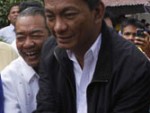
A senior Philippine diplomat, meanwhile said, they were not endorsing Salceda’s proposal but would respect groups that would practice the boycott.
“Neither do we object to it as it is a legitimate expression of the sentiments felt by many Filipinos,” said the same Department of Foreign Affairs source, who asked not to be named.
On Sunday, Salceda said in his Independence Day speech at the provincial hall in Legazpi City: “Let us boycott “Made in China” products. Let us hurt them where it counts.”
By not buying Chinese, the former economic adviser to the Arroyo administration said, “we also protect our children and communities from the pervasive and persistent risks of various types of contamination and poor quality of their products.”
Salceda stressed the need to get back at China through trade, saying it had become the only viable alternative for ordinary Filipinos.
He maintained that he was “not against the Chinese people who are here in our country, but I am against imported Chinese products.”
According to Salceda, “the risks of a China boycott are reasonable and affordable when compared to the costs to national well-being of other options, or of doing nothing.”
“Sure, it will not bring mighty China to its knees but it would make it loud and clear to the imperial mandarins of Beijing that all Filipinos are united in their sentiment: Enough of the bullying that tramples upon our dignity as a nation,” he added.
On Monday, the Philippine Daily Inquirer tried but failed to reach Chinese embassy spokesman Ethan Sun for comment on the issue.
Terry Ridon, chair of the League of Filipino Students, called Salceda’s call an “unrealistic proposition.”
“It would essentially render most of us naked with meager foodstuff and no appliances at home and in the workplace,” said Ridon.
The LFS leader said he was “betting my bottom peso that even (Salceda’s) office would cease to function in such a boycott.”
Ridon believes “the Spratlys dispute will be resolved at the United Nations” with the Philippines invoking the UN Convention on the Law of the Sea.
Kilusang Magbubukid ng Pilipinas secretary general Danilo Ramos urged the government to “explore all diplomatic means to resolve the dispute.”
“A boycott of Chinese products is uncalled for. It would only serve the US agenda to perpetually harass China and deny it a market in favor of American monopolies and justify the massive buildup of the US military in the region,” Ramos added.
Such a boycott “will send the wrong signal” to Beijing, opined Gerry Albert Corpuz, spokesman of the Pambansang Lakas ng Kilusang Mamamalakaya ng Pilipinas.
“The Spratlys dispute should be collectively discussed by the Philippines, China and the other claimant-countries,” said Corpuz, noting Salceda “needs a major, major reality check.”
Bayan Muna party-list Representative Neri Colmenares asserted “a boycott of Chinese products or not traveling to China now will not help quell the rising tension in the Spratlys.”
“On the contrary, it will only aggravate the situation. If China retaliates, it may result in thousands of our overseas Filipino workers in China being harassed,” said Colmenares.
The legislator calls for “discussing the issue peacefully in the Association of Southeast Asian Nations,” which groups the Philippines and nine other countries in the region.
Colmenares, however, said the country should “stand firm against previous intrusions by China in the Spratlys and make sure that we register our strongest protest against future intrusions.”
ACT party-list Rep. Antonio Tinio called Salceda’s call for a boycott of Chinese products “unrealistic and unenforceable.”
In a text message, Tinio said: “I bet Gov. Salceda won’t be giving up the China-made laptop or cellphone he used to send that statement anytime soon.”
“Besides, stirring up jingoistic sentiments is at this point counterproductive. It will unnecessarily inflame passions and further raise tensions when the situation calls for skillful diplomacy,” Tinio added.